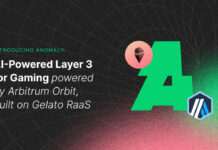What is Byteball?
Blockchain technology has changed the way the world records digital data, but it also has deficiencies that have impeded its overall adoption and use. Hoping to avoid many of the issues associated with blockchain, Byteball has decided to utilize a completely different method to connect and verify its data entirely.
Unlike Bitcoin, which links blocks in a linear chain, Byteball joins newly uploaded information to its database by attaching it to multiple previous data transactions. Building upon each other, the transactions form a structure called a DAG (directed acyclic graph).
Although the platform offers immutable storage for any data type, it’s most noteworthy feature is its versatile conditional payment system. Simple enough for any user to understand, the smart contract system allows you to easily create and tailor smart contracts for any personal need.
Byteball Highlights
Byteball has a wide variety of functions that give it significant advantages over some of its blockchain competitors:
- Multiple Asset Classes – Byteball can be used to store and transfer values of different asset classes such as currencies, bonds, and commodities.
- Privacy – Blackbytes gives users the ability to send payments and messages securely and anonymously.
- Free Distribution – Unlike most cryptocurrencies that have ICOs for profit, Byteball has uniquely decided to give away most of its supply for free.
- Conditional Payments – Byteball allows users to make simple risk-free conditional payments that only complete when the designated contract criteria are met.
- P2P Insurance and Betting – Users can create customed tailored peer to peer smart payments that allow users to sell insurance to one other or to bet on specific world events.
How Does Byteball Work?
Byteball doesn’t have a blockchain nor blocks. Transactions are their own blocks and don’t have to connect in a straight chain; They’re linked to multiple previous transactions and form a structure called a DAG (directed acyclic graph).
Directed Acyclic Graph
Storage units, or balls, are linked to each other such that each storage ball includes one or more hashes of previous storage balls. Byteball connects transactions by signing the hashes of previous transactions to the new one.
This connection between storage balls not only consistently confirms earlier data put in the database but also establishes a partial order in which the storage balls can be referred to. Byteballs has no block size issues simply because it doesn’t have blocks.
The benefits of linking data to create a DAG include:
- Instant Confirmation – DAG technology allows a transaction to get confirmation from Byteball peers almost instantaneously because the system doesn’t rely on miners to verify transactions.
- Transaction Finality – Byteball’s system allows definite transaction completion alerts. This is unlike Bitcoin where the number of confirmations can be used to calculate only the probability that the transaction completed.
- Lower Energy Burden – Byteball requires significantly less energy to keep its network working and secure than proof of work cryptocurrencies.

Byteball Core Features
Byteball comes with core features that make its platform extremely powerful:
- Atomic Exchange – This removes the need to trust a centralized exchange. Instead, transactions between users happen simultaneously or don’t occur at all.
- Regulated Assets – Institutions can easily issue assets that comply with Know Your Customer and Anti-Money Laundering policies.
- Multisignature Capability – For additional security, users can require approval signatures from multiple devices before a transaction processing. Additionally, multisignature capability creates a process for the exchange of shared assets that have more than one owner.
- On-chain Oracles – Oracles are verified data feeds of world events that connect to the database. Users can use an oracle’s imported data to create custom-tailored provisions for any smart contract.
- Immutable Storage – Once data is put into the Byteball database, it can never be changed or removed.
Byteball’s Currency “Bytes”
In Byteball, you must pay a commission using a currency called “Bytes” to add data into the database.
The name of Byteball’s currency directly reflects its value. Extremely intuitive, the number of Bytes you pay to add data to the database corresponds directly to the data size of your transaction. For instance, your commission fee to add 1 Kb of data would be 1,000 Bytes.
Commission fees create a consistent system of value transfer that aligns the interests of all Byteball’s stakeholders. It also prevents users from spamming useless messages to the database.
In addition to payment for storage fees, you can pay Bytes directly to other users for goods or services.
Blackbytes
Byteball has a second currency that can be used on its platform – Blackbytes. Unlike Byte transactions that are completely visible on the DAG, Blackbytes are significantly less traceable. Blackbyte data is not recorded in the public database; Instead, the transaction data is sent directly peer to peer.
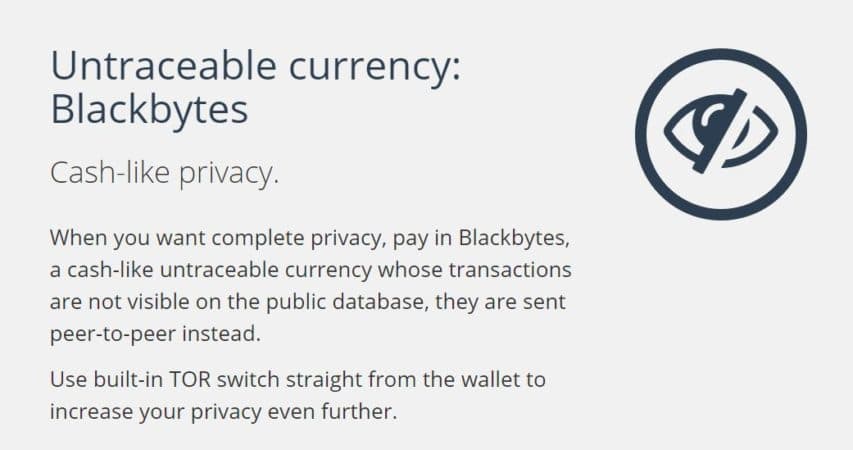
Conditional Payments
Perhaps Byteball’s most innovative feature, conditional bound payments allows users to set a smart contract condition that must occur for the payee to receive bound money. If the payee doesn’t keep his or her promise (or outside data doesn’t meet the stated contract conditional criteria), you can safely take your money back after the designated waiting period.
Although other cryptocurrencies offer comparable smart contracts, the conditional payments system is truly unique because it’s simple and clear enough that any user can read and understand the smart contract they’re creating.
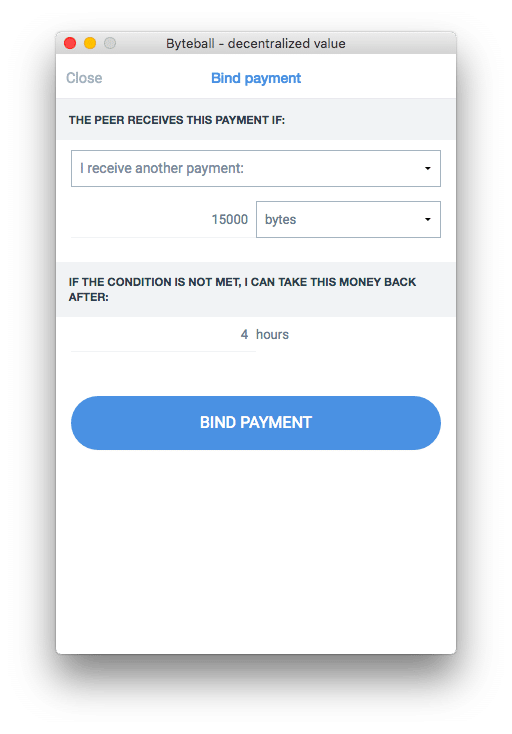
Oracles
Byteball’s conditional payment contracts become much more powerful since oracles are implemented in the platform. Oracles are basically trusted third parties who monitor specific world events and import their results into Byteball as a data feed.
Oracle-Based Betting and Hedging
Combining Byteball’s conditional payment smart contracts with trusted data feeds from oracles, you have the ability to bet on (or hedge against) major world events.
Byteball users can speculate on a wide range of events:
- Sports Events – Bet on the outcome of any sports event in the world without the need of a bookie.
- Weather Events – Hedge against extreme weather events that may affect your business or vacation experience.
- Travel Events – Users can buy flight insurance that allows them to be compensated if a flight is delayed or canceled.
- Political Events – Bet on the result of political events. Users can hedge business risk against undesirable political outcomes.
- Price Events – Price oracles allow you to short any cryptocurrency without owning it. This is done by simply making a smart contract condition that is dependent on a selected coin’s price reaching a certain price threshold.
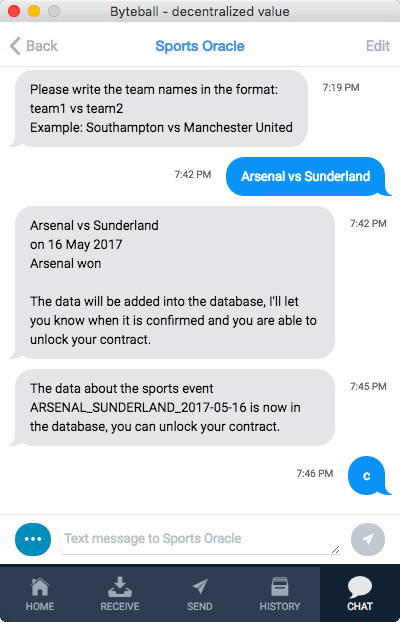
Free Distribution
Crucial to its success, the Byteball teams believes its technology must be widely adopted for it be successful. For that reason, 99% of all Bytes and Blackbytes are to be given away for free.
Byteball currently utilizes several methods to disperse Bytes:
- Purchase Cashback – Byteball offers cash back at merchants and stores the company partners with. Normally, they rewards customers with Bytes equivalent to 10% of the purchase price.
- Verification and Referral Rewards – Users are given $20 worth of Bytes when they verify their identity. Also, users who refer new customers also receive $20 worth of Bytes.
- Youtube Giveaways – Byteball frequently holds youtube contests on the youtube channels of supporters. Contest winners receive varying amounts of Bytes.
Distribution to BTC Holders
In the past, the team has distributed Bytes and Blackbytes for free to BTC holders and to existing holders of Bytes who have linked their accounts. They have now distributed 64.5% of its total supply for free over a total of 10 airdrops over the past year.
Summary of Dispersion Rounds:
- 1st round, December 25th, 2016- 10% distributed
- 2nd round, February 11th, 2017- 1.8% distributed
- 3rd round, March 12th, 2017- 2.0% distributed
- 4th round, April 11th, 2017- 2.3% distributed
- 5th round, May 10th, 2017- 2.9% distributed
- 6th round, June 9th, 2017- 6.6% distributed
- 7th round, July 9th, 2017- 11% distributed
- 8th round, August 7th, 2017- 16% distributed
- 9th round, September 6th, 2017- 5.7% distributed
- 10th round, November 4th, 2017- 6.1% distributed
Total Amount Distributed: 64.5%
Byteball Trading Info
Given away for free over the past year, Bytes have provided a substantial return for its initial airdrop participants. Byteball’s USD price movement has followed a bimodal trading pattern; two price peaks in summer 2017 and new year 2018 accompany mostly sideways price momentum.
Highly correlated to its BTC price for the most of last year, Byteball’s USD price has recently diverged dramatically from it. One possible explanation for this temporary separation includes the projects unusually high amount of announcements and platform updates that it has released over the last several months.
Byteball Quick Facts
- Trading Symbol: GBYTE
- Initial Distribution Price: Free
- Current Market Price: $437.52
- Current Available Supply: 645,222
- Maximum Supply: 1,000,000
Where to Buy Bytes?
Bytes can simply be bought and sold directly in the Byteball wallet by using the Byte-BTC bot. Additionally, Bytes are also traded on select exchanges that include:
Where to Buy Blackbyte?
There are currently two portals ran by independent Byteball developers where Blackbyte is traded:
Byteball Wallet
Both Bytes and Blackbytes must be stored in Byteball’s own wallet. The wallet is available for iOS, Android, Windows, Mac, and Linux.
Byteball’s wallet has two engaging features that separate it from competitor’s wallets:
- Wallet Byteball Store
- Sovereign Identity Verification

Wallet Byteball Bot Store
Available directly in Byteball’s wallet, the Bot Store gives users a current list of available chatbots. Many of Byteball’s features are already offered through the interaction of chatbots.
Smart contracts are created and interacted with by messaging different chatbots from Bot Store. Interacting with smart contracts is as simple as answering a few questions from a helpful chatbot.
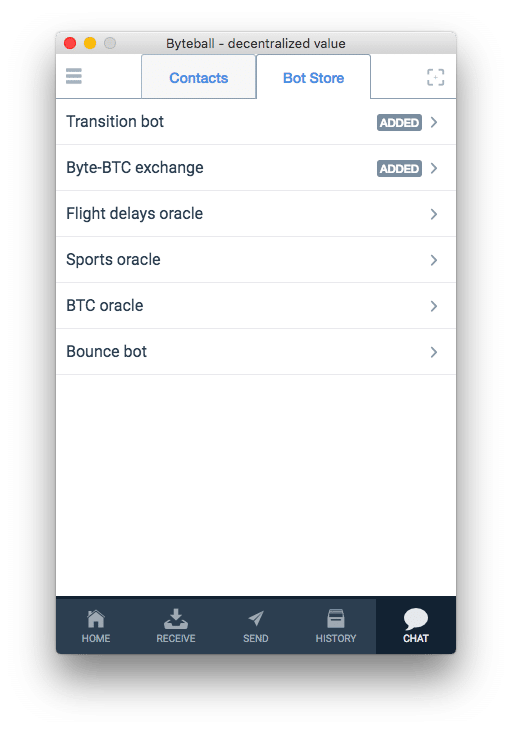
Wallet Sovereign Identity
Byteball’s wallet sovereign identity feature allows users to connect their identity to their wallet. Users then have the ability to disclose their identity during payments if they elect to do so.
Identities are confirmed with the help of Jumio and the Real name attestation bot. Wallet identity verification is practical for payments that make a user declare their identity for legal purposes such as ICO events.
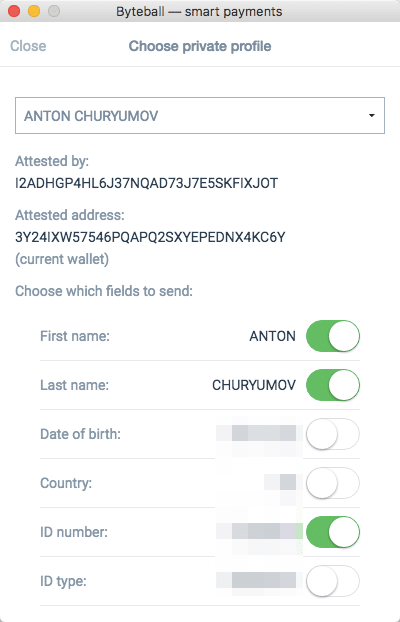
Byteball News
Byteball has announced a lot of major updates to their platform in the last several months that include the release of textcoins and as well as a partnership with Jumio.
Textcoins
In December, Byteball launched its textcoin feature. Textcoins allows any user to send Bytes to anyone with an email address even if the recipient does not have a Byteball wallet yet.
Payments can also be easily and safely sent through text messages on chat channels such as Signal, WhatsApp, and iMessage.
Jumio Partnership
On January 18th, 2017 Byteball announced its partnership with Jumio, a leading provider of identity verification services. With Jumio’s help, you can now securely link your identity to your byteball wallet and address. Additionally, you can publicly display the verified identity of your address for others to see so other users know they are sending assets to the right the address.
Byteball Team
Made up of a small team of less then five members, Byteball is lead by its founder and lead developer, Anton Churyumov. Churyumov has extensive executive experience in the tech sector as he is co-founder and CEO of Teddy ID as well as co-founder and CIO of Platron.
If that wasn’t impressive enough, Churyumov owns SMS Traffic, a Russian technology company that offers solutions and marketing for banks, insurance, and retail firms. Attending Moscow Engineering Physics Institue from 1991 to 1997, Churyumov received his degree in Theoretical Physics.

Conclusion
Connecting data into a directed acyclic graph rather than a traditional linear chain of blocks, Byteball attempts to solve many of the problems that have impeded the mass adoption of blockchain technology. Highlighted by its versatile conditional payments, Byteball offers a smart contract creation system that is simple enough to be utilized by almost any user.
The post What is Byteball? (GBYTE) | Beginner’s Guide appeared first on CoinCentral.

TheBitcoinNews.com – Bitcoin News source since June 2011 –
Virtual currency is not legal tender, is not backed by the government, and accounts and value balances are not subject to consumer protections. TheBitcoinNews.com holds several Cryptocurrencies, and this information does NOT constitute investment advice or an offer to invest.
Everything on this website can be seen as Advertisment and most comes from Press Releases, TheBitcoinNews.com is is not responsible for any of the content of or from external sites and feeds. Sponsored posts are always flagged as this, guest posts, guest articles and PRs are most time but NOT always flagged as this. Expert opinions and Price predictions are not supported by us and comes up from 3th part websites.
Advertise with us : Advertise
Our Social Networks: Facebook Instagram Pinterest Reddit Telegram Twitter Youtube







